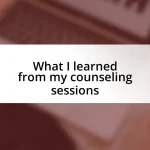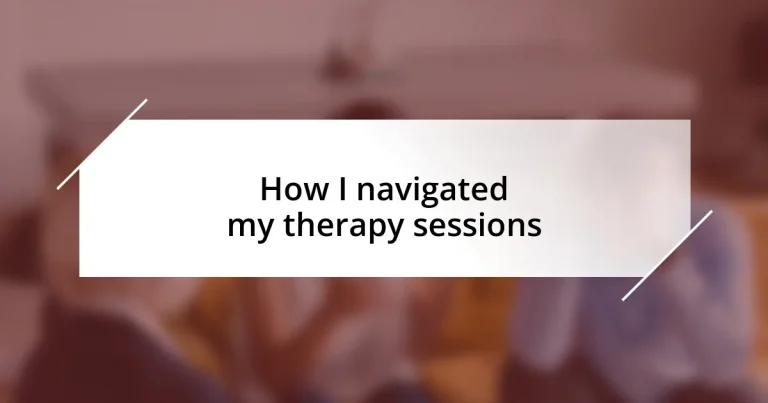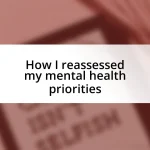Key takeaways:
- Therapy facilitates self-exploration and emotional healing, providing a judgment-free space for understanding oneself.
- Setting clear, achievable goals enhances therapy effectiveness and allows for tracking progress over time.
- Effective communication with your therapist, including honesty and active listening, fosters deeper exploration and personal growth.
- Transitioning out of therapy involves developing a post-therapy plan to maintain learned skills and navigate future challenges independently.
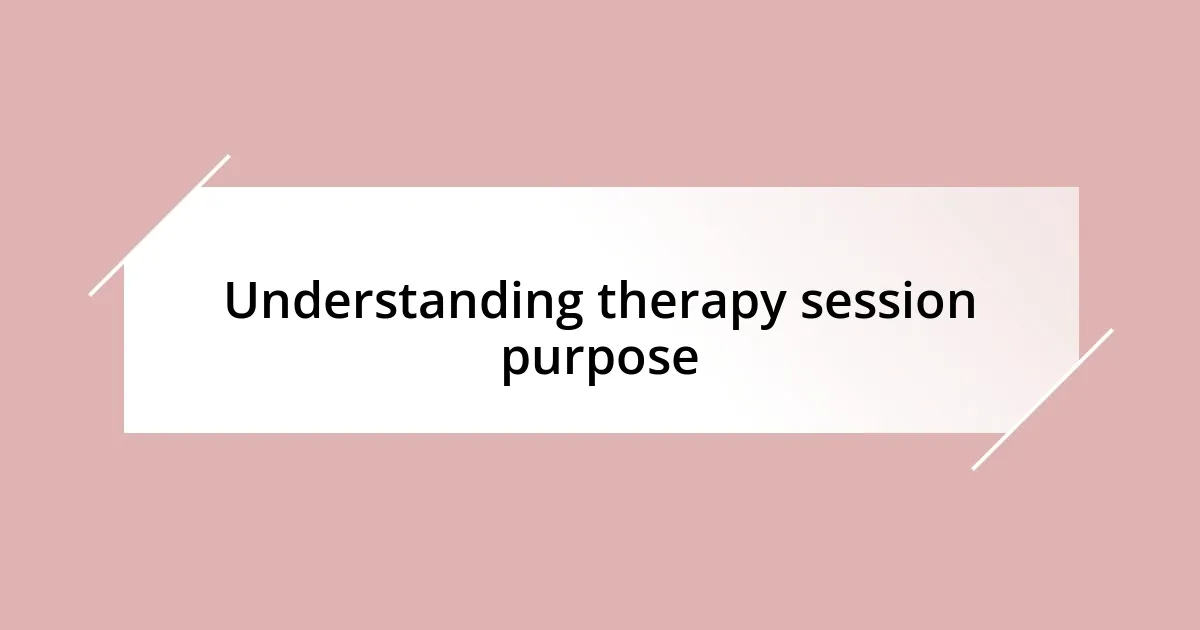
Understanding therapy session purpose
Therapy sessions serve as a structured space for self-exploration and healing. I vividly remember my first session, filled with a mix of fear and curiosity. As I sat in that cozy therapist’s office, I couldn’t help but wonder, “What’s the point of all this?” It felt daunting, yet I quickly realized that understanding myself was the first step toward growth.
Each session became a journey where I could unpack my emotions without judgment. One evening, I found myself crying over a past experience I thought I’d buried. It struck me then, how crucial it is to process these feelings in a safe environment. Have you ever felt the weight of unspoken thoughts? Therapy helped me voice and examine those thoughts, turning them into manageable insights rather than burdens.
The purpose of therapy is not just about addressing problems; it’s about discovering patterns and gaining clarity. I often entered sessions feeling overwhelmed, only to leave with a sense of empowerment. Each discussion peeled back layers of misunderstanding, revealing the threads that wove my experiences together. What if our struggles could lead to deeper self-awareness? That realization transformed my approach to therapy, making each session an opportunity for profound personal growth.
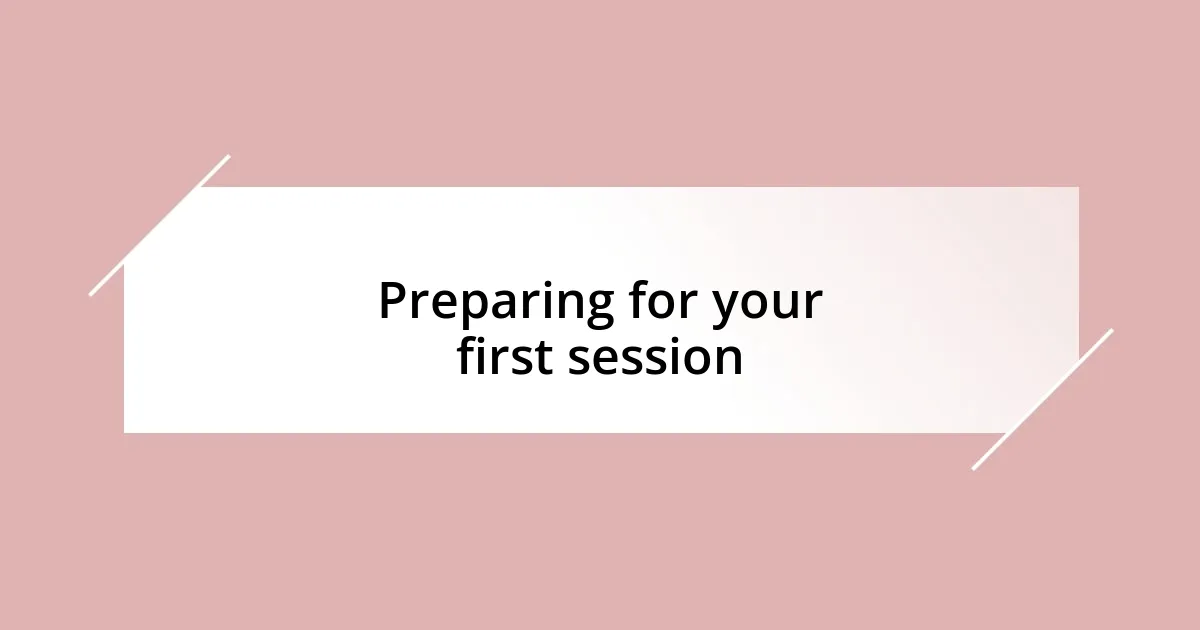
Preparing for your first session
Preparing for your first therapy session can feel daunting, but a little preparation goes a long way. I still remember how I jotted down my thoughts and feelings leading up to that day. A simple list helped me organize my emotions and worries, making it easier to articulate what I wanted to discuss. I realized that clarity breeds confidence, and having a roadmap for my feelings set a positive tone for the session.
Here are a few things to consider while preparing for your first session:
- Identify Goals: Reflect on what you want to achieve in therapy—whether it’s coping with anxiety, processing grief, or improving relationships.
- Write It Down: Make notes about anything you feel is important to share. This could be significant events, emotions, or recurring thoughts that weigh on you.
- Practice Relaxation: Before your session, try deep breathing or meditation to calm any pre-session jitters—trust me, it helps!
- Be Open-Minded: Go in willing to explore unexpected topics. Sometimes, the things you least expect can lead to the most profound breakthroughs.
- Envision Your Ideal Session: Picture what a helpful session looks like for you. This could create a positive mindset and help you engage more openly.
Embracing the unknown can feel scary, but I promise, facing it can also be incredibly liberating. I remember stepping into my therapist’s office for the first time, heart racing, but the act of simply being there was already a step toward growth.
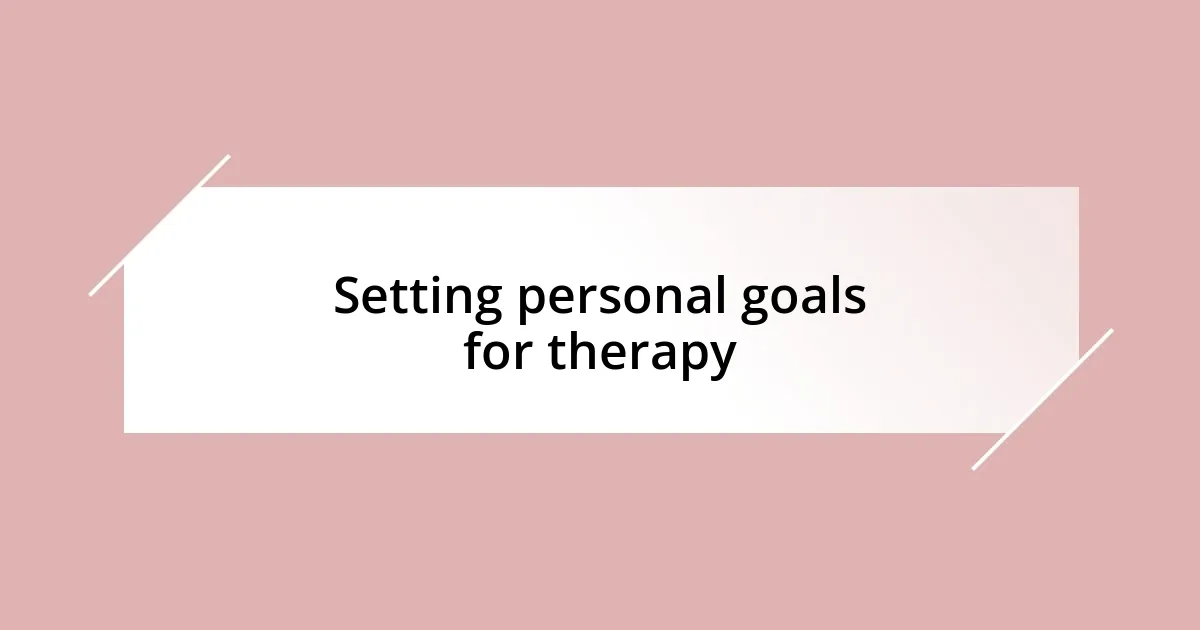
Setting personal goals for therapy
Setting personal goals for therapy is a crucial step in the process. I found that having clear, achievable goals helped shape my sessions. Initially, I wrote down vague desires like “I want to feel better,” but over time, I fine-tuned those goals into specific, manageable objectives. For instance, deciding to work on my communication skills or learning coping mechanisms for anxiety transformed my focus and made my discussions in therapy much more fruitful.
I remember one particularly insightful session when I shared my goal of improving relationships with my family. It felt empowering to surface this desire, as I hadn’t fully realized how important it was to me. My therapist encouraged me to break that goal down—what would success look like? By identifying small, actionable steps, I felt a renewed sense of clarity. Have you ever noticed how breaking a big goal into smaller pieces can make it feel less overwhelming? It was a game-changer for me, prompting concrete discussions and actionable steps during each session.
Throughout my journey, I discovered that revisiting and adjusting my goals was just as important as setting them. I became more self-aware and learned to celebrate small victories. Once, I was thrilled to recognize progress in my assertiveness; it was such a small moment in a session, yet it illuminated how far I had come. Do you find joy in celebrating your progress, no matter how small? It allowed me to maintain motivation while ensuring my therapy sessions remained relevant to my evolving needs.
| Initial Goal Setting | Refining Goals |
|---|---|
| Vague aspirations like “I want to feel better.” | Specific objectives like “Improve communication skills.” |
| Focus on general themes without direction. | Actionable steps leading to clearer discussions. |
| Emotionally driven without measurable outcomes. | Achievement-driven with milestones to celebrate. |
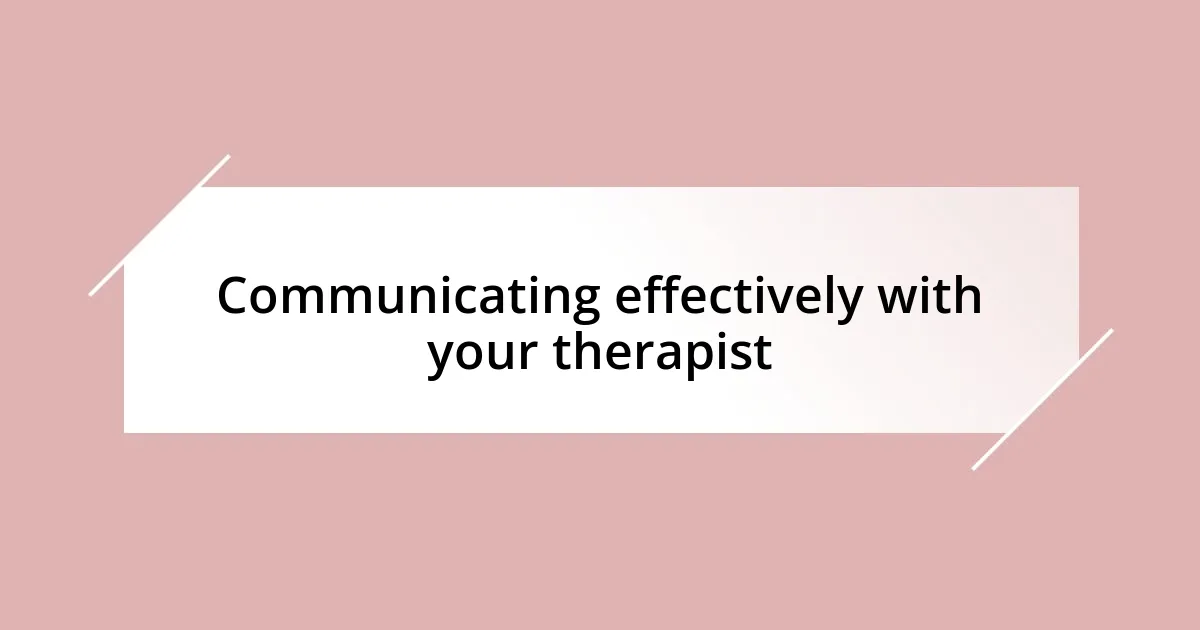
Communicating effectively with your therapist
Communicating effectively with your therapist can truly amplify the benefits of your sessions. I’ve learned that being honest about my feelings, even when it’s uncomfortable, creates a safe space for deeper exploration. For instance, there was a time I struggled to express a particularly dark fear that lingered in my mind. The moment I finally found the courage to voice it, I felt a weight lift off my shoulders. Have you ever noticed how sharing your true self—those hidden thoughts—can ignite a profound conversation?
Listening is just as crucial as speaking. I found that active listening—really paying attention to my therapist’s observations—opened my mind to new perspectives. There was one session where I was taken aback by a simple reflection they made about my behavior. It was so insightful that it sparked a revelation about my avoidance of conflict. What about you? Have you ever experienced a moment when something your therapist said made you see an issue in a whole new light?
Finally, remember to ask questions. I’ve often left a session wondering about something we discussed, and when I brought it up the following week, it led to richer discussions. For example, I learned to ask about my therapist’s methods or theories when something resonated with me. It turned out that diving deeper into their approach not only clarified concepts for me but also empowered me to share what I was learning about myself. Engaging actively like this can transform your sessions into a collaborative journey—one that feels uniquely tailored to your growth. Have you tried engaging in this way? The more involvement I put into the process, the more insights I gained.
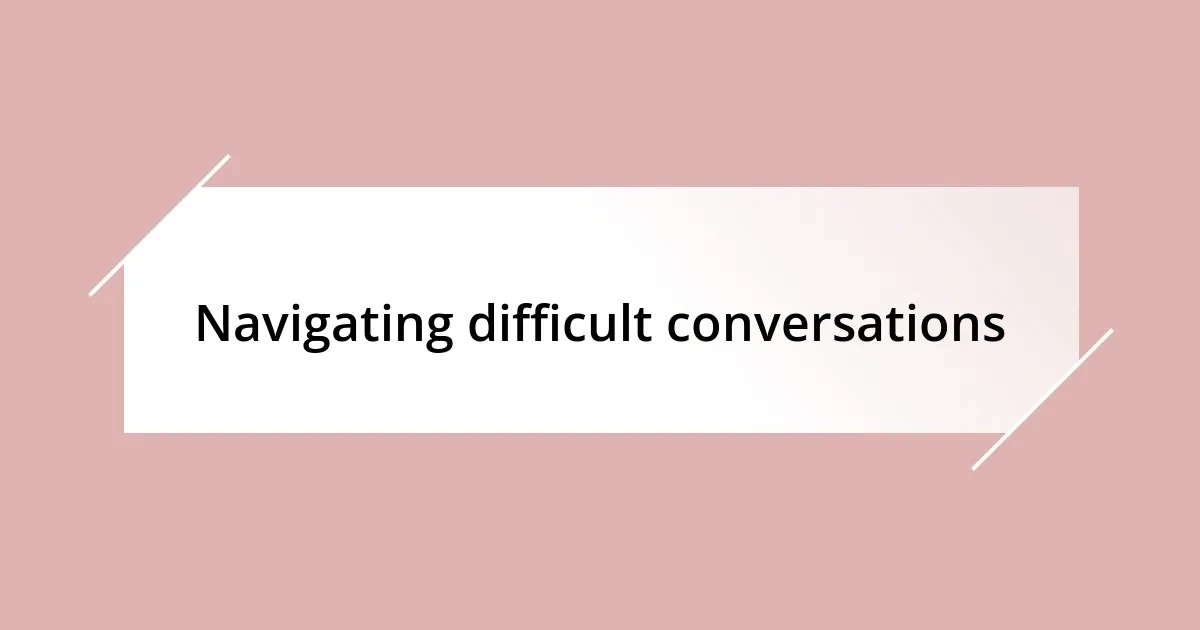
Navigating difficult conversations
Navigating difficult conversations in therapy can be daunting, but I’ve found that approaching these discussions with sincerity makes a significant difference. I remember a session where I had to talk about my feelings of inadequacy related to my job. It felt like lifting a heavy stone off my chest. Have you ever felt liberation after speaking about what weighs you down? The moment I laid those thoughts bare, it opened the door for deeper exploration and healing.
I’ve discovered that framing my concerns as questions can help ease the tension. During one session, I shared, “Why do I struggle to accept compliments?” This simple inquiry shifted the focus from fear to curiosity. It almost felt like a friendly conversation rather than an interrogation of my emotions. Have you tried turning your worries into questions? This technique not only fosters a sense of safety but also encourages a more genuine dialogue with your therapist.
Sometimes, it’s about how you express yourself. I recall a session where my emotions ran high, and I chose to use ‘I feel’ statements. Instead of saying, “You don’t understand me,” I expressed, “I feel unheard when I share my struggles.” This subtle shift not only diminished defensiveness but also created a shared understanding. How do you articulate your feelings in difficult conversations? Learning to frame my feelings constructively turned tough moments into opportunities for growth and connection.
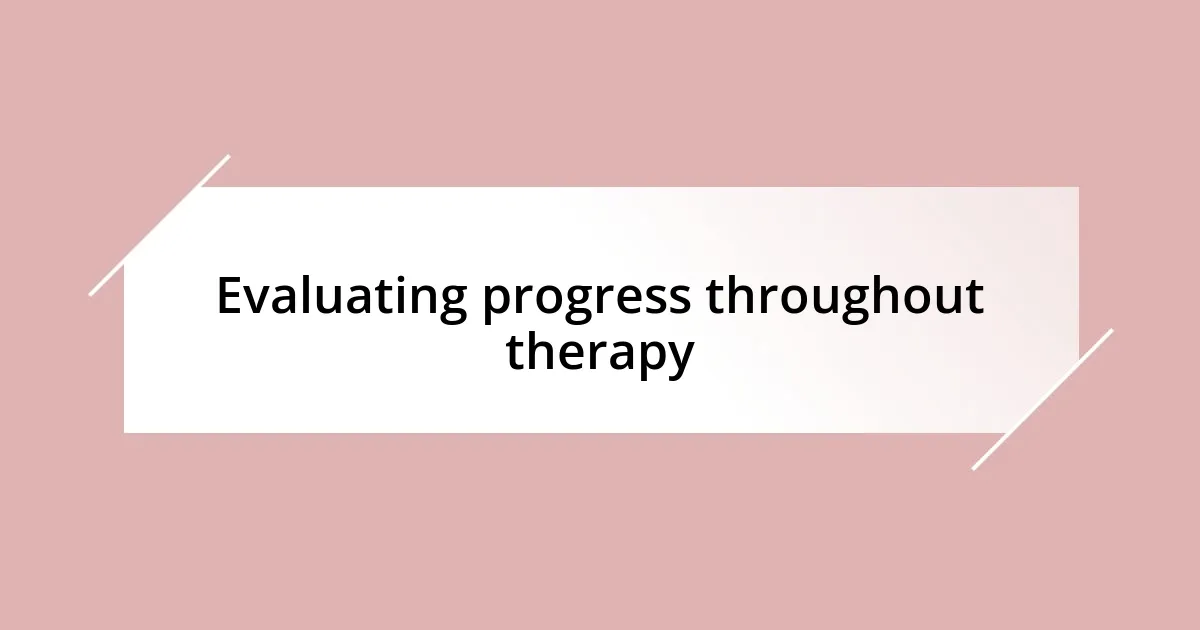
Evaluating progress throughout therapy
Evaluating progress throughout therapy was a transformative experience for me. Early on, I felt uncertain about how to gauge my improvements; however, I started to recognize subtle shifts in my thoughts and feelings. For instance, there was a specific moment when I noticed that I began to feel less overwhelmed by situations that once felt insurmountable. Have you ever caught yourself responding differently to stressors over time? That realization made me appreciate the progress I had made.
I found it beneficial to regularly reflect on my feelings between sessions. Keeping a journal allowed me to record my thoughts, and subsequently, I could revisit them to identify patterns. One week, I wrote about a seemingly insignificant conflict with a friend, but as I read back, I noticed how my approach had changed. I was no longer approaching disputes with panic, but rather with a calm resolve. It’s incredible how tracking small victories reveals growth, isn’t it?
Towards the end of my therapy journey, celebrating milestones became essential. I vividly remember the session when my therapist encouraged me to reflect on a recent achievement. I hesitated, unsure what to highlight, but then I recalled volunteering—a step I once feared. A wave of pride washed over me. How often do we overlook our accomplishments? Acknowledging those moments of progress can fuel motivation and reinforces the importance of the journey—one that is uniquely ours.
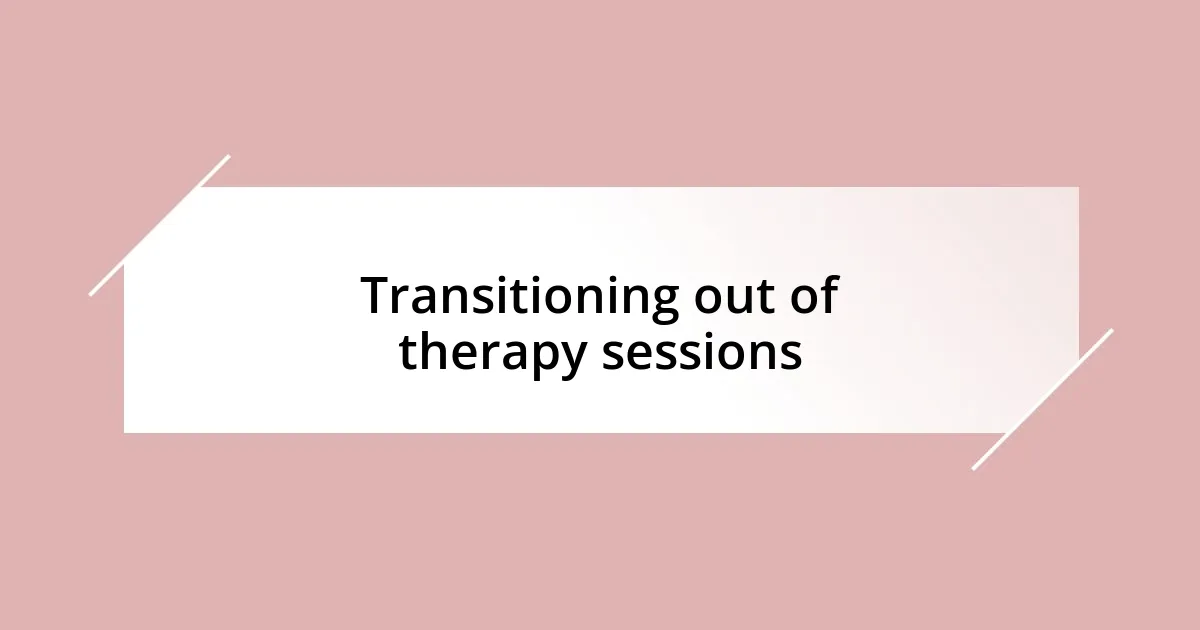
Transitioning out of therapy sessions
As I began to transition out of therapy sessions, I felt a mix of excitement and apprehension. I remember one particular session where my therapist asked me to reflect on what I had learned. It felt surreal, acknowledging that I had the tools to navigate my emotions without relying on that safe space every week. Have you ever wondered how you’ll cope without that regular support? This led me to realize that the skills I had cultivated were not just temporary; they were becoming part of who I was.
In my final sessions, we focused on creating a post-therapy plan. I found this incredibly empowering. I started to identify triggers and strategies that I could use in everyday life, like grounding techniques or mindfulness exercises. I recall leaving that session with a small list of action items that felt like a roadmap to independence. Did you ever think about how clarifying your next steps can help ease the transition? It made a world of difference knowing that I had a plan.
On the last day, saying goodbye was bittersweet. I expressed my gratitude to my therapist, recounting how far I’d come and the transformation I experienced. It felt like closing a chapter of a book but also the beginning of a new adventure. Have you ever felt that strange blend of loss and hope? As I stepped out of the office one final time, I embraced the mix of emotions within me, confident that I was ready for the path ahead.






